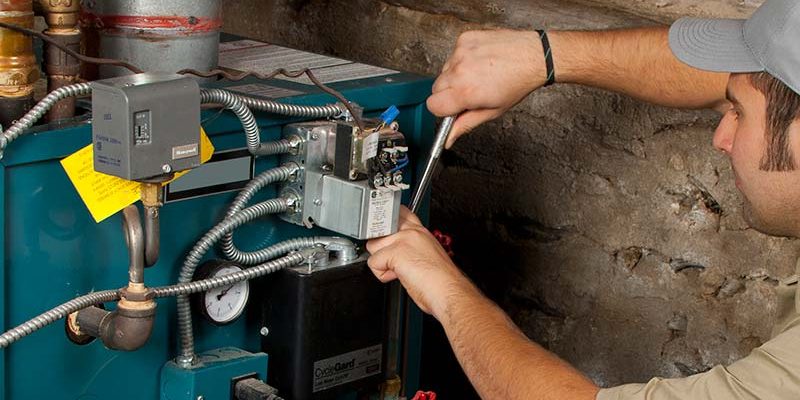Proper heating system maintenance is crucial for ensuring that your home remains warm and energy-efficient throughout the colder months. Regular maintenance not only extends the lifespan of your heating system but also improves safety and reduces energy costs.
Heating System Maintenance
Why Heating System Maintenance is Essential
Regular heating system maintenance ensures that your system runs efficiently, preventing unexpected breakdowns and costly repairs. It keeps your system running at peak performance and ensures your home is comfortably heated.
Benefits of Regular Maintenance
Maintaining your heating system can reduce your energy bills, extend the equipment’s lifespan, and decrease the likelihood of costly emergency repairs. It also ensures that your system is safe to operate, reducing the risk of carbon monoxide leaks or fire hazards.
Overview of Common Heating Systems
Common types of heating systems include furnaces, heat pumps, boilers, and radiators. Each system has specific maintenance requirements that are crucial for optimal performance and efficiency.
Understanding Your Heating System
Types of Heating Systems
The main types of residential heating systems include forced air, radiant heat, baseboard, and steam radiant systems. Each type has unique components and maintenance needs.
How Heating Systems Work
Most heating systems operate by circulating heated air or water through a network of ducts or pipes. Understanding how your system works can help you identify maintenance needs and potential problems.
Key Components of a Heating System
Key components include the heat exchanger, blower motor, thermostat, and ductwork for forced air systems, and boilers or radiators for hydronic systems. Regular checks are essential to ensure these parts function properly.
Setting Up a Maintenance Schedule
Annual Check-Ups
Schedule annual heating system maintenance to ensure your system is ready to handle the winter months efficiently. This check-up should be performed by a qualified technician.
Seasonal Preparations
Prepare your heating system for winter by cleaning or replacing filters, checking for duct leaks, and ensuring that all components are in good working order.
When to Call a Professional
While some tasks can be done DIY, complex issues such as repairing electrical components or handling natural gas are best left to professionals.
DIY Maintenance Tips
Cleaning and Replacing Filters
Regularly cleaning or replacing air filters is one of the simplest yet most effective forms of heating system maintenance. This should be done every 1-3 months during the heating season.
Checking and Sealing Ductwork
Inspect your ductwork for leaks or holes that can reduce the efficiency of your system. Use duct sealant or metal-backed tape to repair any leaks.
Testing Thermostats and Controls
Check your thermostat settings to ensure they are accurate. Consider upgrading to a programmable thermostat if you haven’t already done so for better heat management and energy savings.
The Importance of Professional Inspections
What Professionals Look For
During a professional inspection, technicians check for issues like improper airflow, mechanical problems, or potential safety hazards such as carbon monoxide buildup.
Tools and Techniques Used
Technicians use advanced tools like carbon monoxide detectors, manometers, and infrared cameras to detect leaks and inefficiencies in your heating system.
Decoding Inspection Reports
Understanding the terminology and findings in inspection reports can help you make informed decisions about any necessary repairs or upgrades.
Common Problems and Solutions
Uneven Heating
If some rooms are colder than others, it may indicate issues with your ductwork, inadequate insulation, or problems with the heating unit itself.
Strange Noises
Noises such as rattling, banging, or whining can indicate mechanical issues. Loose panels can rattle, while a lack of lubrication can cause whining or grinding noises.
High Energy Bills
Unexpected increases in your energy bills often indicate that your heating system is not running efficiently. This could be due to dirty filters, leaks in your ductwork, or a failing component.
Energy Efficiency and Your Heating System
Upgrading to Energy-Efficient Models
Consider replacing older heating systems with newer, more energy-efficient models. Look for ENERGY STAR-rated systems to maximize efficiency.
Optimizing Existing Systems
Regular heating system maintenance can help optimize the efficiency of your existing system, reducing energy consumption and lowering bills.
Benefits of Energy Efficiency
Energy-efficient heating systems not only lower energy bills but also reduce your carbon footprint and improve the overall comfort of your home.
Safety Considerations in Heating Maintenance
Detecting Carbon Monoxide
Ensure your home has a carbon monoxide detector near the heating system and that it’s tested regularly. This can be a lifesaver, detecting harmful CO levels produced by malfunctioning heating equipment.
Preventing Fire Hazards
Keep the area around your heating system clear of flammable materials. Regular maintenance checks can also identify potential fire hazards like electrical issues or overheating components.
Electrical Safety Tips
Inspect electrical connections for signs of wear or damage. Have a professional repair any frayed wires or unstable connections to prevent electrical fires.
Cost-Benefit Analysis of Regular Maintenance
Reducing Repair Costs
Regular heating system maintenance helps catch issues before they become major problems, significantly reducing repair costs over time.
Extending System Lifespan
A well-maintained heating system can last several years longer than a neglected one, maximizing your investment.
Savings on Energy Bills
Maintained systems operate more efficiently, which means they use less energy to heat your home, resulting in lower energy bills.
Troubleshooting Common Heating System Issues
What You Can Fix vs. When to Hire a Pro
Learn to differentiate between simple fixes you can do yourself, like replacing filters or resetting a tripped breaker, and issues that require professional expertise.
Quick Fixes for Common Issues
For minor issues like a blown fuse or a thermostat not responding, quick DIY fixes can save a call to the technician. Always ensure the system is powered off before attempting any repairs.
Warning Signs of Serious Problems
Be aware of signs like persistent odd noises, frequent cycling on and off, or unusual smells, as these can indicate serious problems that might require professional attention.
The Future of Heating Technologies
Smart Heating Systems
Smart thermostats and systems that allow for remote monitoring and control are becoming standard for their convenience and efficiency benefits.
Renewable Energy Options
Systems like solar-powered heating or geothermal heat pumps are gaining popularity for their sustainability and long-term cost savings.
Innovations in Heating Efficiency
Technological advancements continue to improve heating efficiency, including developments in heat pump technology and more efficient furnace designs.
Preparing Your Heating System for Winter
Necessary Adjustments
Make necessary adjustments such as setting your programmable thermostat to reduce heating when the house is empty or when everyone is asleep.
Protecting Against Winter Strains
Take steps to protect your system from winter strains by ensuring your home is well insulated. This helps retain heat and reduces the workload on your heating system.
Checklist Before the Cold Hits
Run through a checklist before winter to ensure your system is ready to handle the cold. This includes inspecting insulation, sealing leaks, and a full heating system maintenance check-up.
Legal and Insurance Aspects of Heating Maintenance
Compliance with Local Regulations
Ensure that your heating system and any maintenance or repairs comply with local building codes and safety standards to avoid legal issues.
Insurance Requirements
Some homeowners’ insurance policies require regular heating system maintenance to keep the policy valid, especially for coverage of damages resulting from system malfunctions.
Record Keeping for Warranty and Insurance
Keep detailed records of all maintenance and repairs for warranty purposes and insurance claims. This documentation can be crucial for validating claims and warranties.
Frequently Asked Questions About Heating System Maintenance
1. How often should I have my heating system serviced?
Answer: It is recommended to have your heating system serviced annually, ideally before the start of the cold season. This ensures your system is in top condition and ready to operate efficiently during the winter months.
2. What does routine heating system maintenance include?
Answer: Routine maintenance typically includes inspecting and cleaning the heat exchanger, checking and replacing the air filters, testing the thermostat to ensure it works properly, inspecting electrical connections, and checking the system’s safety controls and startup cycle.
3. Can I perform any heating system maintenance tasks myself?
Answer: Yes, some maintenance tasks can be performed by homeowners, such as changing air filters, testing the thermostat, and ensuring vents are not blocked by furniture or curtains. However, more technical tasks should be left to professionals.
4. What are the signs that my heating system needs maintenance?
Answer: Signs that your heating system may need maintenance include unusual noises, a decrease in heating efficiency, frequent cycling on and off, the system not reaching the set temperature, and increased energy bills.
5. Why is it important to change the air filter regularly?
Answer: Regularly changing the air filter in your heating system helps maintain airflow, which improves energy efficiency and extends the life of the system. A clean filter also improves indoor air quality by trapping dust, pollen, and other allergens.
6. How can heating system maintenance save me money?
Answer: Regular maintenance improves the efficiency of your heating system, reducing energy consumption and lowering utility bills. It also helps identify and fix minor issues before they become major problems, potentially avoiding costly repairs.
7. What happens if I skip regular maintenance?
Answer: Skipping regular maintenance can lead to decreased heating efficiency, higher energy costs, and increased wear and tear on the system, which may result in premature breakdowns and expensive repairs. It can also lead to safety hazards, such as carbon monoxide leaks.
8. How long does a professional maintenance visit take?
Answer: A typical professional maintenance visit for a heating system usually takes about an hour to complete, depending on the system’s complexity and condition.
9. What is the best time of year to schedule maintenance for my heating system?
Answer: The best time to schedule maintenance for your heating system is in the early fall before the heating season begins. This helps ensure that your system is ready to provide reliable and efficient heat throughout the winter.
10. Are there any benefits to signing up for a maintenance plan with a heating service provider?
Answer: Yes, signing up for a maintenance plan often includes benefits such as regular inspections, discounts on repairs, priority service, and peace of mind knowing that your heating system is being monitored regularly by professionals.
11. Can regular maintenance extend the life of my heating system?
Answer: Yes, regular maintenance can significantly extend the life of your heating system by ensuring that all components are functioning correctly and efficiently, thus preventing undue stress and wear on the system.
12. How do I know if my heating system needs to be replaced instead of repaired?
Answer: If your heating system is older than 15-20 years, requires frequent repairs, fails to heat your home evenly or efficiently, or if notice a significant increase in your energy bills, it might be more cost-effective to replace it rather than continue with repairs.
Conclusion
Regular heating system maintenance is not just a technical necessity; it’s an investment in the comfort and safety of your home. By following the guidelines outlined in this guide, homeowners can ensure that their heating system remains efficient, safe, and reliable throughout its operational life.
Call to Action
Don’t wait for the cold season to find out your heating system isn’t ready. Schedule a professional heating system maintenance check today to ensure your system is efficient, safe, and ready to handle whatever the winter throws at it.






